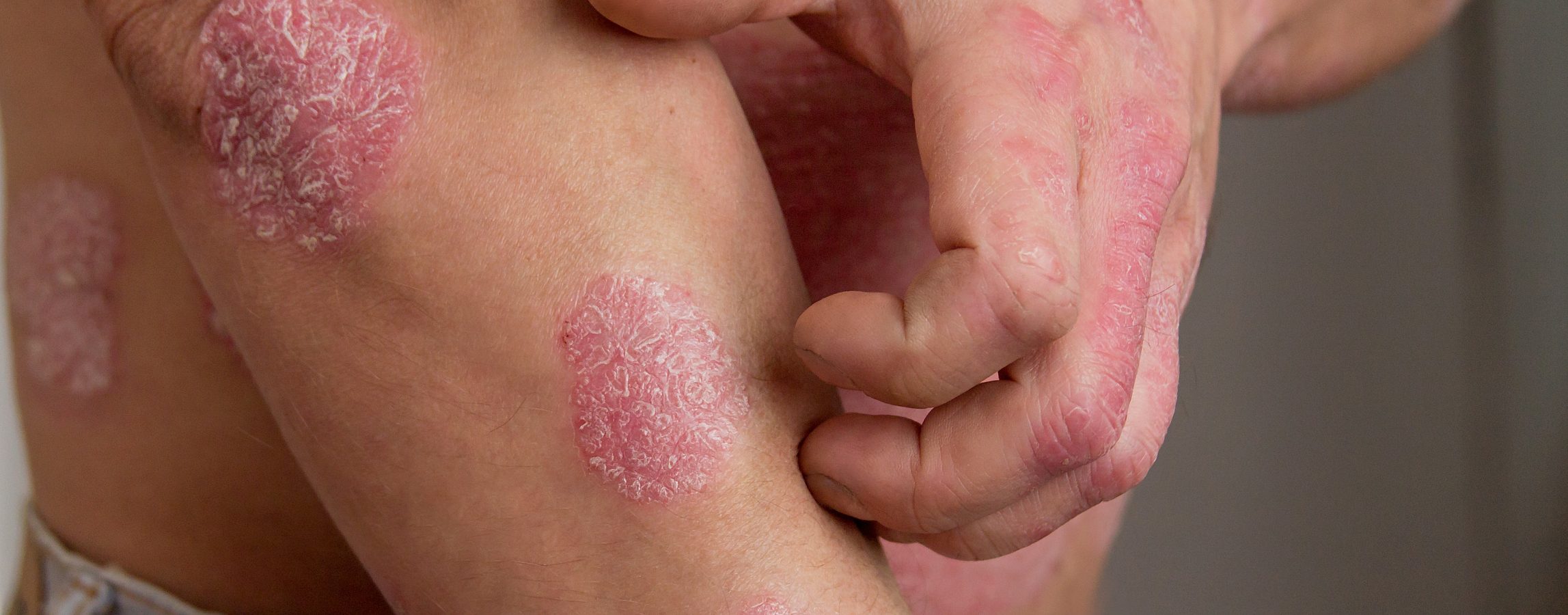The first episode of psoriasis usually strikes between the ages of 15 and 35. It is a chronic condition that will then cycle through flare-ups and remissions throughout the rest of the patient’s life. Psoriasis affects as many as 7.5 million people in the United States and it is estimated that about 20,000 children under age 10 have been diagnosed with this condition. If you’re struggling with this issue, our team at Glendale Dermatology can help.
What Is Psoriasis?
Psoriasis is a skin condition that creates red patches of skin with white, flaky scales. It most commonly occurs on the elbows, knees and trunk, but can appear anywhere on the body. In normal skin, skin cells live for about 28 days and then are shed from the outermost layer of the dermis. With psoriasis, the immune system sends a faulty signal which speeds up the growth cycle of skin cells causing them to mature in a matter of 3-6 days. The pace is so rapid that the body is unable to shed the dead cells, and patches of raised red skin covered by scaly, white flakes form.
Do I Have Psoriasis?
Though this skin condition is a genetic disease (it runs in families), it is not contagious. If you have the following symptoms, you may have one of these types of psoriasis:
- Plaque Psoriasis (Psoriasis Vulgaris): About 80% of all sufferers get this form of the disease. It is typically found on the elbows, knees, scalp, and lower back. It classically appears as inflamed, red lesions covered by silvery-white scales.
- Guttate Psoriasis: This form of the disease appears as small red dot-like spots, usually on the trunk or limbs. It occurs most frequently among children and young adults. Guttate comes on suddenly, often in response to some other health problem or environmental trigger, such as strep throat, tonsillitis, stress, or injury to the skin.
- Inverse Psoriasis: This type appears as bright red lesions that are smooth and shiny. It is usually found in the armpits, groin, under the breasts, and in skin folds around the genitals and buttocks.
- Pustular Psoriasis: This type looks like white blisters filled with pus surrounded by red skin. It can appear in a limited area of the skin or all over the body. The pus is made up of white blood cells and is not infectious. Triggers include overexposure to ultraviolet radiation, irritating topical treatments, stress, infections, and sudden withdrawal from systemic (treating the whole body) medications.
- Erythrodermic Psoriasis: One of the most inflamed forms, erythrodermic psoriasis looks like fiery, red skin covering large areas of the body that shed in white sheets instead of flakes. This form is usually very itchy and may cause some pain. Triggers include severe sunburn, infection, pneumonia, medications, or abrupt withdrawal of systemic treatment.
What Is the Treatment for This Condition?
There is no known preventative measure or cure for this illness. However, we can offer some very effective treatments. Treatment aims to minimize the symptoms and speed healing. The severity of the disease impacts the choice of treatments. Psoriasis is classified as mild to moderate when it covers 3-10% of the body and moderate to severe when it covers more than 10% of the body. At Glendale Dermatology, we can offer the following treatments for this condition:
- Over-the-Counter Medications – Such as salicylic acid, scale lifters, bath solutions, occlusion, and moisturizers. For mild to moderate cases.
- Prescription Topical Treatments – Such as Anthralin, Calcipotriene, Betamethasone Dipropionate, Calcitriol, Tazarotene, and topical steroids. For mild to moderate cases.
- Prescription Oral Medications – This includes Otezla, acitretin, cyclosporine, and methotrexate. For moderate to severe cases.
- Light Therapy – Also called phototherapy, this is a method of targeting symptoms with controlled UVB light to eliminate psoriasis without harming healthy skin. At Glendale Dermatology we can perform light therapy with XTRAC® laser treatments and Narrowband UV therapy.
- Biological Injections – Over the past twenty years, a whole host of medications have been developed and can provide excellent control of psoriasis in those patients whose condition can not be controlled otherwise.
Which treatment Dr. Brezel will prescribe for you will depend on the severity of your condition and the doctor’s assessment of your skin and what it will best respond to at your consultation. For the most severe cases, he may recommend biologics, a new classification of injectable drugs designed to suppress the immune system.
What Kind of Results Can I Expect From Laser Treatment for Psoriasis?
We have seen great results with our laser treatment for this condition. Some patients see improvement after only 3-4 treatments, and significant improvement after 6-10 treatments, with clearance in 10-20 treatments, lasting six months or more.
Where Can I Find Psoriasis Laser Treatment in Queens, NY?
To find out if you have psoriasis and if laser treatment is right for you, come see us at Glendale Dermatology for a consultation. To schedule a visit, simply fill out and submit our contact form below and someone will be in touch to arrange your appointment as soon as possible.

